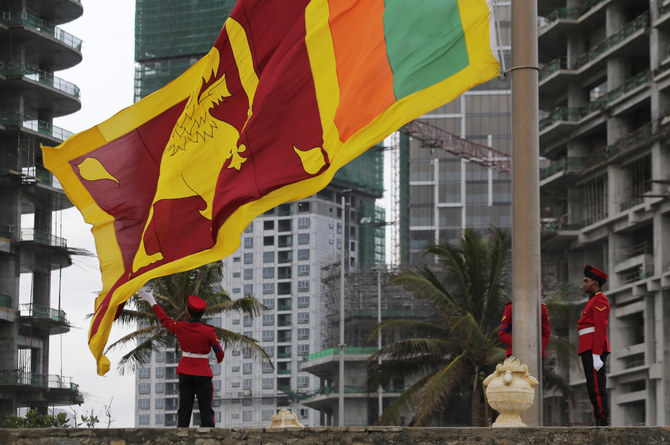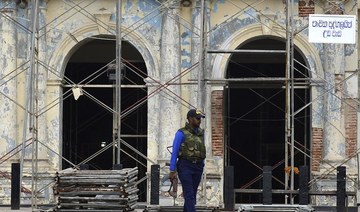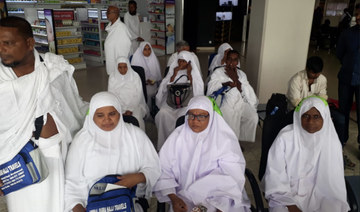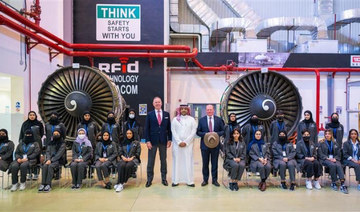COLOMBO, Sri Lanka: Shocks from deadly suicide bombings on Easter Day in Sri Lanka are reverberating throughout its economy in the worst crisis since the South Asian island nation’s civil war ended in 2009.
The blasts that killed more than 250 people were blamed on extremists. They have devastated Sri Lanka’s vital tourism industry, source of jobs for many, and are hindering foreign investment.
Sri Lanka’s economy already was in trouble, dogged by political crisis, its currency under pressure from a growing national deficit and rising debt. The attacks have added to those challenges.
Business is the worst it’s been in the 60 years that Ranepura Hewage Jayasena has been doing business in the capital Colombo, where he runs a shop that sells spectacular wooden carvings, wooden elephants and clothing designed for tourisms.
“Almost 100% of my business is gone. There are days without a single sale,” said Jayasena, 76, looking grief-stricken as he went through the previous days accounts.
“We had a war that raged for years, but we had good business. Bombs exploded in Colombo city itself, but that did not affect our business,” he said. “This is the worst period I have seen in my life.”
Seven suicide bombers struck two Catholic and one Protestant church and three luxury hotels on April 21. The Daesh group claimed responsibility for the attacks, which were carried out by a local radicalized Muslim group known as National Thowheed Jammath.
Among those killed were 45 foreigners, mainly from China, India, the US and Britain.
For days after the attack, many businesses remained shuttered. Tourists fled: the number of arrivals dropped more than 70% from a year earlier in May and nearly 60% in June.
The economy is forecast to grow at about a 3% pace this year, according to Central Bank governor Indrajit Coomaraswamy, way below the 6% plus average of recent years and possibly the lowest level in nearly 20 years.
The worst hit have been people, many of them self-employed, living close to the brink of poverty, economists say.
“Sri Lanka is undergoing a severe economic crisis at present and it is manifested at both the individual and national level,” said W.A. Wijewardena, an economic analyst and a former deputy governor of central bank.
The blasts “surely caused a temporary setback to the economy, which was already a sick one,” Wijewardena said.
While a huge share of job losses were in the tourism sector, they’ve rippled through many other industries.
Sanjeewa Samarasinghe, a 51-year-old father of three, began working as a marketing manager at a publishing company in June, after a long stint without a job. He was let go after just one week due to weak sales after the attacks.
“It’s true sales had plunged, but look at the plight of workers. How can they live?” he said.
For K.S. Mahendran, a peddler of mobile phone accessories on a sidewalk in downtown Colombo, recovery seems as far off as the day the explosions ripped through the churches and hotels
In a matter of hours, Mahendran’s business collapsed, leaving him without a way to pay rent and other daily expenses.
“The attacks were a severe blow to us and almost ruined our lives,” he said. “We had to borrow money from money lenders and we are in a great difficulty at the moment. No one is helping us.”
Sri Lanka has made significant progress thanks to a tourism boom and expanding manufacturing after the military defeated separatist Tamil rebels in May 2009, which ended the 25-year civil war. The country was engulfed in a political crisis late last year, however, when President Maithripala Sirisena suspended Parliament, firing the prime minister and replacing him with former strongman Mahinda Rajapaksa, who had ruled Sri Lanka as president for nine years from 2005.
Sirisena eventually backed down, reinstalling Ranil Wickremesinghe as prime minister. But divisions within the leadership are not helping the country overcome its myriad problems in the aftermath of the attacks.
Government debt is rising quickly as tax revenues fall far short of spending. Weakening growth also is adding to the burdens for repaying foreign debt totaling $33 billion as of March, as the country digs itself in deeper to meet repayments that will total nearly $6 billion in 2019.
With Sri Lanka’s foreign exchange reserves expected to drop to as low as $6.3 billion by the end of this year, in June the government raised $2 billion from US dollar bond markets in its 14th bond offering since 2007.
“That’s not a wonderful level of reserves, but it is nowhere near a crisis either,” Coomaraswamy said in a recent speech. He noted the government could arrange foreign currency swaps and also seek panda or samurai bonds from China or Japan.
“If you take all these together, we feel fairly confident that we can manage the situation,” he said.
Apart from the direct impact from business disruptions and falling tourist arrivals, the attacks shattered a sense of stability that had helped draw in foreign investment.
Muslims living in this Buddhist-majority nation have suffered attacks and dozens of their shops and homes were burned, frightening both local and foreign investors.
“The government has not been able to eliminate the ‘economic fear’, that is, the fear that the economic assets owned by people could be destroyed by mobs with total impunity, from the minds of investors,” said Wijewardena.
“It is absolutely necessary for the government to build confidence among investors by bringing the trouble makers to justice,” he said.
So far, most efforts to cushion the impact of the attacks have focused on tourism. The government has slashed airline ground charges, aviation fuel prices and departure fees for at least six months. It set a one-year moratorium for repayment of loans for tourism-related businesses and cut interest rates on new loans.
Leaders also ordered officials to slash spending on electricity, water and telephone costs, banning use of public funds to print diaries and calendars for 2020.
Some businesses are seeing improvements.
Suresh Silva’s shoe shop was only selling one or two pairs of shoes a week just after the bombings. Sales are now back up to about 90% of normal, he said.
“I think the remaining 10% could be achieved this month.”
For many, though, the outlook remains uncertain.
“People have limited cash on hand, so they spend it on essential items such as food and medicine,” said Hameed Aslam, who runs a fabric shop.
“In my view it’s been like this for the past three years,” he said. “Living costs have been going up and the people are having great difficulties.”
Easter Day attacks imperil Sri Lanka economic recovery
Easter Day attacks imperil Sri Lanka economic recovery

- Sri Lanka’s economy already was in trouble, dogged by political crisis, its currency under pressure from a growing national deficit and rising debt
- Seven suicide bombers struck two Catholic and one Protestant church and three luxury hotels on April 21
PIF’s Alat unveils electrification, AI infrastructure business units

RIYADH: Alat, a flagship company of the Public Investment Fund, unveiled two business units in electrification and AI infrastructure, to establish Saudi Arabia as a premier manufacturing hub globally.
The company unveiled its plans during the Milken Institute Conference held in Los Angeles.
According to a press release, the move comes as part of the PIF company’s strategic vision to spearhead a paradigm shift in industry sustainability while propelling Saudi Arabia on the global stage.
Alat Global CEO Amit Midha said: “I am pleased to announce these two exciting new divisions as they will make a significant contribution to Alat’s overall strategic goal of developing an advanced, sustainable future for the industry.”
The electrification arm will fortify grid technology, catering to the burgeoning demand for electricity driven by exponential growth in renewable energy sources like solar, wind, and hydrogen.
By harnessing Saudi Arabia’s solar energy and other clean resources, the firm seeks to manufacture innovative solutions that will catalyze the global energy transition and drive decarbonization in industry.
The electrification unit will specifically focus on enhancing transmission and distribution technologies, facilitating the integration of renewable energy into existing grids, and pioneering advancements in gas and hydrogen generation and compression technologies.
On the other front, the AI Infrastructure business unit will address the escalating global demand for AI capabilities across industries.
This entails the development of cutting-edge technologies encompassing network and communications equipment, servers, data center networking, storage, industrial edge servers, and Industry 4.0 computing.
“The global electrification market size reached $73.64 billion in 2022 and it is expected to hit around $172.9 billion by 2032, growing at a CAGR of 8.91 percent between 2023 and 2032,” the press release added.
The global AI Infrastructure market is set to hit $460.5 billion by 2033, with a robust 28.3 percent compound annual growth rate, driven by widespread adoption across industries for innovation, decision-making enhancement, and task automation.
As a gold sponsor at the Milken Institute Conference, the firm now has nine business units focused on sustainable technology manufacturing.
“Alat will invest $100 billion by 2030 across these business units to develop key partnerships and build advanced manufacturing capabilities in Saudi Arabia to bring jobs and economic diversification to the Kingdom,” the press release said.
Saudi Arabia’s Qiddiya to build region’s largest water theme park

- Aquarabia will also feature the first underwater adventure trip with diving vehicles
RIYADH: Saudi Arabia Qiddiya Investment Co. will construct the region’s largest water theme park as a cornerstone of its Six Flags Qiddiya City venture it was announced on Monday.
To be named Aquarabia, Qiddiya hopes to draw visitors from around the globe with 22 attractions and water experiences suitable for all family members, as well as some “world-first” attractions, Saudi Press Agency reported.
These attractions include the world’s first double water loop, the tallest water coaster with the highest jump, the longest and highest water racing track, and the tallest water slide.
Aquarabia will also feature the first underwater adventure trip with diving vehicles, catering to adventure enthusiasts with water sports areas designated for rafting, kayaking, canoeing, free solo climbing, and cliff jumping.
Additionally, the park will introduce the first surfing pool in the Kingdom, incorporating immersive design elements themed around ancient desert water springs and Qiddiya’s wildlife.
With sustainability in mind, Aquarabia will implement advanced systems capable of reducing water waste by up to 90 percent and decreasing energy consumption. As part of the Six Flags Qiddiya project, the venture, the first Six Flags of its kind outside North America, aims to recycle operational waste, diverting over 80 percent from landfill.
Scheduled to open in 2025, both Aquarabia and Six Flags Qiddiya City are situated within Qiddiya City, forming a fully walkable neighborhood offering a diverse array of activities, accommodations, dining options, and relaxation spots.
Abdullah Al-Dawood, managing director of Qiddiya Investment Co., hailed the announcement as a significant milestone for Qiddiya and the entertainment, tourism, and sports sectors in the Kingdom.
He emphasized that the projects will cater to diverse entertainment needs while contributing to economic diversification and job creation in the tourism sector.
The project also aims to meet the growing local demand for immersive entertainment experiences, particularly in water activities, aligning with the goals of Saudi Arabia’s Vision 2030 to enhance local tourism and employment opportunities.
The unveiling of Aquarabia follows the announcement of several other entertainment, sports, and cultural attractions in Qiddiya, including the world’s first multi-use gaming and electronic sports area, the multi-sport Prince Mohammed bin Salman Stadium and the Dragon Ball amusement park.
Saudi Arabia ascends as key destination for global talent: BCG report

RIYADH: Saudi Arabia has emerged as a key player in attracting global talent amid ongoing geopolitical shifts and financial uncertainty, moving up two spots on the list of preferred countries for workforce mobility.
The “Decoding Global Talent 2024” report by Boston Consulting Group highlights Saudi Arabia’s rise to the 26th most preferred country, underscoring the success of the Kingdom’s strategic initiatives to position itself as a global hub for professionals.
This fourth edition of the study draws insights from over 150,000 professionals across 188 nations, tracking global talent trends since 2014.
Riyadh’s rise to the 54th rank globally underscores its emergence as a hub of opportunity and progress in the eyes of global talent.
Christopher Daniel, managing director and senior partner at BCG, said: “As the global talent shortage becomes an increasingly pressing challenge for the world's foremost economies, Saudi Arabia is emerging as a pivotal player in narrowing this gap.”
He added: “With a significant proportion of respondents citing the quality of job opportunities, the attractive income, tax, and cost of living, as well as the assurance of safety, stability, and security as key reasons for choosing the Kingdom, it’s evident that Saudi Arabia’s strategic investments in its labor market are bearing fruit.”
Daniel noted that the Kingdom is leveraging labor migration to enhance its workforce, offering a secure and hospitable environment that caters to the diverse needs of international professionals.
“By fostering a job market that is attuned to the evolving aspirations of global talent while prioritizing their well-being, Saudi Arabia is positioning itself as a compelling destination for those seeking growth and fulfillment in their careers,” he said.
Furthermore, the report highlights that younger generations and individuals from rapidly expanding populations are particularly attracted to global mobility, pursuing diverse experiences and opportunities for professional growth.
With 23 percent of global professionals actively pursuing international positions and 63 percent remaining receptive, Saudi Arabia is well-positioned to capitalize on this trend.
The Kingdom offers an enriching environment for a globally oriented workforce to excel and progress in their careers, presenting an enticing option for individuals seeking both personal and professional advancement in an ever more interconnected global landscape.
Riyadh Air to expand fleet with additional aircraft orders, CEO reveals

RIYADH: Saudi Arabia’s Riyadh Air plans to bolster its aircraft lineup through additional orders, as it requires “a very large fleet” to establish itself alongside regional giants, stated the CEO.
This move comes as the Kingdom’s second flag carrier, backed by the country’s Public Investment Fund, ordered 39 Boeing 787-9 jets last year, with options for 33 more.
It also aligns well with Saudi Arabia’s goal to expand its aviation industry and attract more tourists, broadening its airline capacity beyond pilgrimage travel, which currently forms the backbone of the country’s inbound tourism.
“We need a very large fleet, we’re going to make a number of additional orders,” CEO of Riyadh Air, Tony Douglas, said in an interview with Bloomberg Television.
He added: “We will be making a narrowbody order, we’ll probably be doing another large order after that to build us up to scale.”
During the interview, Douglas, who previously led the Abu Dhabi flag carrier Etihad Airways, expressed being “very conscious” of potential delays to aircraft deliveries. This concern arises as both Boeing and Airbus SE grapple with production challenges amidst record demand and supply issues at the two plane makers.
The establishment of a second Saudi national airline alongside the existing flag carrier Saudia is part of the Kingdom’s economic diversification plan.
In November 2023, Douglas expressed confidence in the demand for travel. “We’re not well enough connected. It’s as simple as that,” he said at the time.
The new airline stands to benefit from Saudi Arabia’s rapidly growing economy and the increasing influx of tourists to the Kingdom. Riyadh Air does not intend to pursue mergers and acquisitions to fuel its growth. “No, it’s organic,” Douglas emphasized at the time.
The initial destinations will include major cities in Europe, the US East Coast, and Canada, with the inaugural flight scheduled to depart by June 2025.
By that time, Riyadh Air will have secured slots at major airports, Douglas mentioned, although hubs like London Heathrow are already operating close to capacity.
“It won’t be easy ... but we have no reason to be anything other than confident that we’ll resolve all of that,” he said at the time.
Saudi Arabia and Egypt retain top spots in MENA travel preferences: Wego study

RIYADH: Saudi Arabia and Egypt remain dominant destinations among Middle East and North Africa travelers in 2024, retaining top spots in international preferences, according to a study.
Singapore-based travel booking app Wego ranked Egypt as the top destination for tourists from the region between January and April, followed by the Kingdom, with India consistently holding the third spot since 2016.
Saudi Arabia’s second spot on the wish list is a clear indication of the Kingdom’s progress as a global tourist destination, aligning with its National Tourism Strategy aiming to attract 150 million visitors by 2030.
“We are excited to see Egypt emerge as the leading destination for travelers in the MENA region during Q1 2024. According to Wego's data, Egypt stands out as a favored choice among travelers seeking unique cultural experiences and diverse attractions,” said Mamoun Hmedan, chief business officer at Wego.
He added: “Meanwhile, the United Kingdom retains its position as the preferred European destination for Middle Eastern travelers.”
Among Middle East destinations, the top three — Egypt, Saudi Arabia, and UAE —maintained their positions from 2023. Egypt and the Kingdom, in particular, have consistently held the top two spots since Wego began tracking customer trends over a decade ago.
The study utilized traveler searches and hotel booking data from its website as the foundation for its findings.
The report further revealed that the UAE ranked as the fourth favorite destination, followed by Pakistan, Kuwait, and Turkiye.
Meanwhile, China dropped one spot, reaching the 27th top destination among MENA travelers.
The UK remains the top European destination from the Middle East, holding the first spot for 10 of the last 11 years, briefly overtaken during the pandemic. Italy has notably surged from fourth to second.
Italy, a top global tourist spot, consistently ranks in the top ten European destinations for Middle East travelers.
This year marks Italy’s debut in the top three. Joint investments between Saudi Arabia and Italy in late 2023, along with direct flights by ITA Airways to Riyadh and Jeddah, signify growing ties.
Countries farther from the Gulf region, such as Morocco, Indonesia, and the US experienced the most decline among top destinations.
This trend continued in 2024, with Malaysia, the Philippines, and the US dropping out of the global top 10, while Kuwait, Pakistan, and Jordan, which entered the top ten last year, remain preferred destinations for MENA travelers.

















